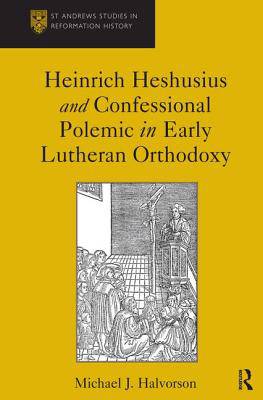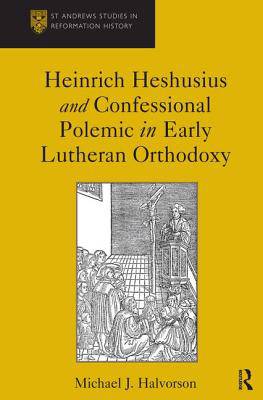
- Retrait gratuit dans votre magasin Club
- 7.000.000 titres dans notre catalogue
- Payer en toute sécurité
- Toujours un magasin près de chez vous
- Retrait gratuit dans votre magasin Club
- 7.000.0000 titres dans notre catalogue
- Payer en toute sécurité
- Toujours un magasin près de chez vous
Heinrich Heshusius and Confessional Polemic in Early Lutheran Orthodoxy
Michael J Halvorson
290,45 €
+ 580 points
Description
Heinrich Heshusius (1556-97) became a leading church superintendent and polemicist during the early age of Lutheran orthodoxy, and played a major role in the reform and administration of several German cities during the late Reformation. As well as offering an introduction to Heshusius's writings and ideas, this volume explores the wider world of late-sixteenth-century German Lutheranism in which he lived and worked. In particular, it looks at the important but inadequately understood network of Lutheran clergymen in North Germany centred around universities such as Rostock, Jena, Königsberg, and Helmstedt, and territories such as Braunschweig-WolfenbÃ1/4ttel, in the years after the promulgation of the Formula of Concord (1577). In 1579, Heshusius followed his father Tilemann to the newly founded University of Helmstedt, where Heinrich served as a professor on the philosophy faculty and established lasting connections within the Gnesio-Lutheran party. In the 1590s, Heshusius completed his doctoral degree in theology and worked as a pastor and superintendent in Tonna and Hildesheim, publishing over seventy sermons as well as a popular catechism based on the Psalms and Luther's Small Catechism. As confessional tensions mounted in Hildesheim, Heshusius worked as a polemicist for the Lutheran cause, pressing for the conversion or expulsion of local Jews. At the same time, Heshusius began to argue aggressively for the expulsion of Jesuits, who had been increasing in number due to the activities of the local bishop and administrator, Ernst II of Bavaria. By discussing the connection between these two expulsion efforts, and the practical activities Heshusius undertook as a preacher, catechist, and administrator, this study portrays Heshusius as a zealous protector of Lutheran traditions in the face of confessional rivals. Understanding this zeal, and the policies, piety, and propaganda that came as a result, is an important factor in relating how Lutheran orthodoxy gained momentum within Germany in the last decades of the sixteenth century. In all this book will reveal the complex characteristics of an important (but virtually unknown) Lutheran superintendent and theologian active during the era of confessionalization, providing a useful resource for the ongoing efforts of scholars hoping to understand the nature of orthodoxy and its importance for early modern Europeans.f
Spécifications
Parties prenantes
- Auteur(s) :
- Editeur:
Contenu
- Nombre de pages :
- 290
- Langue:
- Anglais
- Collection :
Caractéristiques
- EAN:
- 9780754664703
- Date de parution :
- 28-09-10
- Format:
- Livre relié
- Format numérique:
- Genaaid
- Dimensions :
- 156 mm x 234 mm
- Poids :
- 585 g

Les avis
Nous publions uniquement les avis qui respectent les conditions requises. Consultez nos conditions pour les avis.






